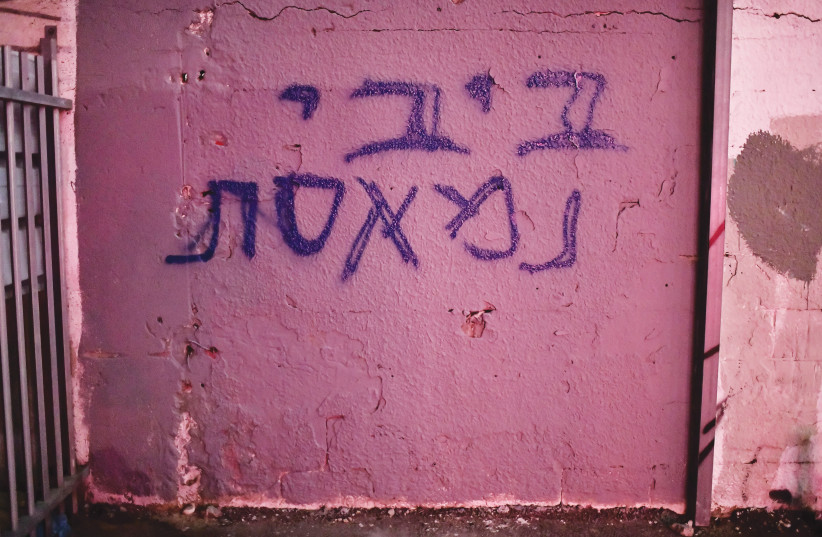Spending the holidays with family can be difficult at the best of times, and Passover is certainly no exception. And this year, with the political divides in Israel running deeper than ever, some people may find themselves nervous, fearing the conversations and arguments that may erupt between themselves and their families as the political becomes personal.
While many are able to engage in healthy political debate with family and friends, others find themselves getting uncomfortable as the conversation turns from healthy discussion to unpleasant arguing.
So as Passover approaches rapidly amid a country so divided that thousands are taking to the streets on a weekly basis, some are more nervous than ever that this holiday season may strain their familial ties beyond repair.
When differences become too large
Speaking to the Magazine, Simcha, an immigrant now living in the center of the country, explained why this year he decided not to spend Passover with his relatives, who hold views in line with those of National Security Minister Itamar Ben-Gvir’s Otzma Yehudit party.
He explained that, while he has always been aware of his relatives’ politics, the differing beliefs have become more of an issue in recent months, due to the current political landscape in the country.

“It has become more of an issue for me recently because of the current state of political affairs. When the last government was in power, to me it was less of an issue because – and I’m trying to figure out the best way to phrase this – their people weren’t the ones in power. So what could really be done? They didn’t have the right to gloat over me.
“But now it feels that because their people are in power, they’re more emboldened with their bigotry. Honestly, that’s what it comes down to,” Simcha continued.
“They’re more emboldened to be racist. They are openly racist toward Arabs, which is something that bothers me deeply.”
Asked if his family knows the full extent of his differing political ideologies, Simcha said that while they probably do, it’s not something he talks about much.
“They don’t know just how left-wing I am because I feel like that would be a very uncomfortable discussion."
Simcha
“I assume that they know that I’m left-wing, or that they know that I’m more left-wing than they are, which is easy to be. They haven’t said anything outwardly, but they’ve made snide jokes about my positions on certain topics.
“They don’t know just how left-wing I am because I feel like that would be a very uncomfortable discussion, especially when it comes to things like Israel and Zionism. They’re very, very nationalistic with their Zionism, and my positions are a bit more left-wing than that. So I feel that it’s a very uncomfortable conversation, and I don’t want to make my family more uncomfortable with this topic than necessary.”
So if political conversations are generally avoided, and Simcha keeps his left-wing beliefs quiet, what was behind the decision to turn down a holiday invitation this Passover?
“I don’t want them to feel like I’m validating their behavior,” he said. “I don’t want them to feel like I think that it’s acceptable. I don’t want to feel like I’m aligning myself with them or participating in something that I believe is morally reprehensible.
“I think that by opening my heart to them, I’m opening my heart to their behavior and their bigotry, which is something I cannot bring myself to do.”
Nothing to worry about? A non-politically-charged family
For Daniel, who was born and raised in Beit Shemesh, the issue of political divides in Israel has been less complicated. With a family who all hold centrist or Center-Right ideologies, there’s not much to argue about, and if there are arguments, they’re soon forgotten.
“My political stance and the political stance of my siblings and my family, in general, isn’t all that different,” he explains, telling the Magazine why he isn’t too concerned about the upcoming holidays.
“There are a few main differences where they’re more right-wing than I am, but not to an extreme level. There’s not that huge of a difference.”
“You know, at the end of the day, nobody in my family is a Nazi. There are certain thresholds and I don’t believe anyone has managed to pass the threshold of being a Nazi, or anything else that extreme.”
Daniel
And, if someone around the table should hold a view with a more pronounced difference from others, Daniel believes it wouldn’t be an issue, either.
“None of us feel uncomfortable with someone else having a different opinion to us. It’s just interesting to hear about it. It’s good for the conversation, it’s fun, it’s not all that serious.”
“You know, at the end of the day, nobody in my family is a Nazi. There are certain thresholds and I don’t believe anyone has managed to pass the threshold of being a Nazi, or anything else that extreme,” he adds, laughing.
“So yeah, communicating about politics isn’t bad. It’s just not a charged topic for us.”
WHILE THE solution to political heartache for Simcha has been to remove himself from the situation entirely, and for Daniel, it’s a lighthearted topic that doesn’t result in any hard feelings, others have found that the years of arguing around a holiday table, while frustrating at times, can lead to greater understanding of politics and of each other.

When divides bring people closer
Speaking to the Magazine, E, who requested anonymity, explained that while her political opinions once differed widely from her family’s, leaving her feeling snubbed and like she had to hide her opinions to keep the peace, the political differences have dulled over time, creating a more relaxed environment.
“There are no rules, and the rules we’ve had until now seem to be ‘Try to get the non-right-wing or right-leaning family members as riled up as possible,’ and ‘Be as factually incorrect as you can, while riling up said family members.’"
E.
Asked if there are rules that her family has put in place in order to try to keep the dinner table political conversations from turning heated, E said that there are no real boundaries, at least not in any serious way.
“There are no rules, and the rules we’ve had until now seem to be ‘Try to get the non-right-wing or right-leaning family members as riled up as possible,’ and ‘Be as factually incorrect as you can, while riling up said family members,’” she said with a laugh.
And while some people are dreading their family Passover meals this year, with the political divide between them and their loved ones feeling deeper than ever, E is optimistic, believing that if anything, the current political landscape will have brought people together who are on the same page.
“We do still have many different opinions, especially on global politics,” she explained, “but between [Prime Minister Benjamin] Netanyahu’s behavior over the past few years, as well as the rise of [Bezalel] Smotrich and [Itamar] Ben-Gvir, and now the judicial reforms, my previously Likud-voting family members have moved in a more centrist direction.”
She sees the way in which the gap has closed between her family members in the way that political debates have become less personal and less judgmental. Whereas in the past, E often felt that her politics negatively impacted her relationship with her family or made her feel isolated from them, she has noticed a change in recent months.
“As the years go by, things have definitely gotten easier, and we even find ourselves agreeing sometimes. There’s definitely less yelling at the table these days,” she said. “In some ways, I suppose we actually have Netanyahu to thank for what will hopefully be a far more peaceful holiday this year.”
